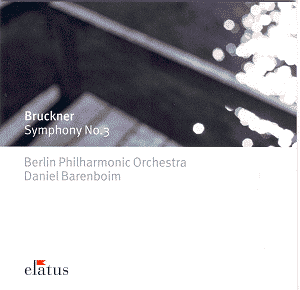In whichever version (1873, 1877 or 1889) Bruckner’s
Third is a marvellous symphony. In this reviewer’s opinion this
was the first of the symphonies to proclaim the full range and
power of his genius. Daniel Barenboim, in common with an increasing
number of interpreters, chooses the 1877 revision, which differs
most markedly from the first version by having various cuts in
the finale.
Traversing the finale’s structure is therefore
a particular challenge, and it is one that this performance succeeds
in making successfully. The choices of tempi are well made, and
though one may cavil at the occasional detail, the general effect
is altogether commendable, so too the long-term vision. Barenboim
is an experienced hand in this repertoire and it shows. Likewise
the balancing of orchestral sections is effective and sometimes
penetrating in its observation of detail. For example, the lyrical
gesangperiode of the first movement can seldom have been
articulated with more loving care and attention, yet always with
a feeling of the utmost spontaneity.
As a Bruckner acoustic the Philharmonie in Berlin
has been captured inconsistently, but it sounds well here, so
all praise to the producer and engineer, Martin Fouqué
and Eberhard Sengpiel. This is a live performance and the audience
are particularly self-effacing and well behaved; would that it
were always so. The playing of the Berlin Philharmonic Orchestra
is quite wonderful, with sure tone and complete accuracy. But
above all the quality of the dynamic range is remarkable. This
is not to be taken for granted, and owes something to the recording
as well. Both the pianissimo playing and the climaxes are striking
in their effect.
In Bruckner capturing the right sound counts
for so much, and for rather more than might be the case with other
composers. Phrases need the chance to breathe, and the string
sound needs to expand resonantly. Rarely can this venue have contributed
so effectively to recorded performances, as witnessed by the magnificent
climax that releases the recapitulation.
As far as the interpretation is concerned, there
are some questions also, most notably in the last two movements.
The tempo in the third movement scherzo is on the slow side, and
some might call it sluggish, but any doubts are redressed in the
finale, where Barenboim handles the intricacies of the structure
with great cunning and true understanding.
If in the final analysis Bernard Haitink’s 1990
recording with the Vienna Philharmonic (on Philips) is to be preferred,
in truth there is little to choose. And Barenboim has an advantage
in terms of price. It really is a memoir of a special occasion,
and ‘special occasion’ is a description that is apposite as far
as any performance of a Bruckner symphony is concerned.
Terry Barfoot
